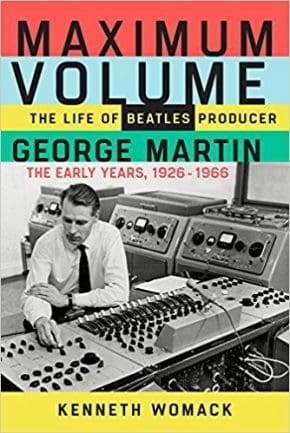
The first book of two, Maximum Volume traces Martin’s early years as a scratch pianist, his life in the Fleet Air Arm during the Second World War, and his groundbreaking work as the head of Parlophone Records, when Martin saved the company from ruin after making his name as a producer of comedy recordings. In its most dramatic moments, Maximum Volume narrates the story of Martin’s unlikely discovery of the Beatles and his painstaking efforts to prepare their newfangled sound for the British music marketplace. As the story unfolds, Martin and the band craft numerous number-one hits, progressing toward the landmark album Rubber Soul—all of which bear Martin’s unmistakable musical signature.
Published Sept 2017, Chicago Review Press.
Reviews:
The first of a Beatles expert’s two-volume biography of Sir George Martin (1926-2016), up to his 40th birthday and the making of “Rubber Soul.”
Martin’s early years weren’t all that different from the scruffy lads’ working-class roots in Liverpool. Womack (Humanities and Social Sciences/Monmouth Univ.; World Trade Center Through Time, 2017, etc.) amply shows how Martin’s personality, plus his music and production abilities, made him an ideal partner for the group. He later had record releases, too, and performed on some Beatles’ records. Martin was doing well as a young producer at EMI/Parlophone’s Abbey Road studio working with musicians and doing successful comedy records with Peter Sellers and Spike Milligan. He “enjoyed the act of bringing his artists’ musical visions to life.” For the Beatles, Parlophone was the “last-chance saloon.” Everybody had turned them down. The band’s manager, Brian Epstein, convinced Martin to give them a chance. The Beatles were ecstatic. Martin offered them a four-year, nonbinding contract and in June 1962, met and heard them for the first time. He was unimpressed. Pete Best, the drummer, was awful, and they had no frontman. Martin didn’t think they were very good musicians, but he liked their sense of humor and there was “something special” and charming about them. When they came back with a new drummer, Ringo Starr, he was hopeful and recorded their first single: “How Do You Do It / Love Me Do.” Martin even asked them to do a long-player. Womack chronicles how the singles and albums were carefully crafted and how Martin gradually became a major contributor to each song’s sound. He describes in fascinating detail how the transformative “A Hard Day’s Night,” written in just 10 hours by Lennon and McCartney for director Richard Lester, heralded a “musical paradigm shift.”
An authoritative account of pop-music history and the man who helped shape it. – Kirkus
“It’s a pleasure to work with Isabel. She always knows exactly which proposals to pitch to me and makes the whole process run so smoothly.”
David Barraclough, Managing Editor, Omnibus Press